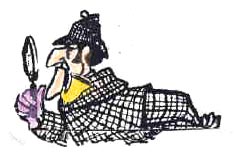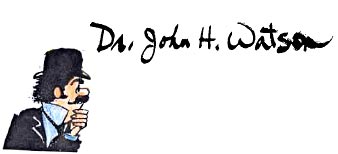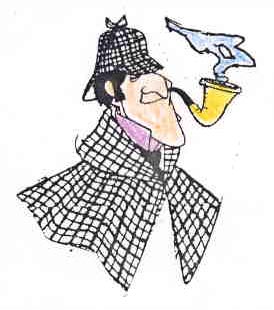 THE ADVENTURE OF SHERLOCK HOLMES AND THE 1920s RADIO DRAMA THE ADVENTURE OF SHERLOCK HOLMES AND THE 1920s RADIO DRAMA
by R. R. King © 2008
(From Radio Recall, June 2008)
It is with a heavy heart that I open my word processor program to write these words which may deprive the great William Gillette of one of his many legendary accomplishments. For he is often cited as the first actor to portray my friend Mr. Sherlock Holmes on the radio, in a fabled 20 October 1930 broadcast of "The Adventure of the Speckled Band" over the NBC.
I alone know the absolute truth of the matter, and I am satisfied that the time has come when no good purpose is to be served by its suppression. It now lies with me to tell for the first time in public what may actually have taken place between Mr. Sherlock Holmes and the Radio Dramatists of 1920s America.
In an incoherent and, as I deeply feel, an entirely inadequate fashion, I will endeavour to give what I am sure is an incomplete account of some of Holmes' pre-Gillette radio appearances, drawn from newspaper clippings available on computerized databases at my local public library. My resources being limited, there is no reason to think that the list below is in any way exhaustive.
The newspapers are not always reliable, so the information should be used with caution. Further research will be necessary to confirm or refute the particulars. But these few scattered references paint a suggestive portrait of Holmes' activities in those lean years before George Washington Coffee rescued him from penury with a weekly cheque.
Very sincerely yours,
Dr. John H. Watson

The WGY Players, responsible for what is generally considered the first weekly radio drama series, were scheduled to perform a dramatization of "The Sign of the Four" on 9 November 1922. The 6 November 1922 Indianapolis Star reports:
One of the features of the program for the week of Nov. 6 from WGY at Schenectady, N. Y., will be the production of ‘The Sign of the Four,’ a Sherlock Holmes play from the pen of Sir Arthur Conan Doyle. The WGY Players will be cast in the play with Edward H. Smith in the part of the famous detective of fiction, and F. H. Oliver as Dr. Watson. Musical numbers will be played between the episodes or acts by the WGY orchestra.
This was the WGY Players' twelfth scheduled play in their first season on the air. Since all of their scheduled productions this season were based on stage plays, it seems likely that "Sign" was adapted from a stage version, perhaps the one by Charles P. Rice, rather than directly from the novel. Incidentally, one of the other plays scheduled for later that season was William Gillette's "Secret Service."
Edward H. Smith, who usually played leading roles in these early WGY productions, is reported to be the person who first suggested the idea of broadcasting drama to the station's director. Frank Oliver, a theater veteran, was probably radio's first regular sound effects artist.
Here are the cast members, as listed in the 9 November 1922 Hartford Courant:
7:45 p. m. Radio drama. Melodrama--"The Sign of the Four" Arthur Conan Doyle
The Cast:
Sherlock Holmes ... Edward H. Smith
Dr. Watson ... F. H. Oliver
Mary Morstan ... Viola Karwowska
Major Sholto ... James S. B. Mullarkey
Jonathan Small ... Frank Finch
Mrs. Mordecai Smith ... Ida Myreck
Wiggins..... Henry Miller
In the late 1920s, NBC aired an anthology drama series called "Retold Tales" which featured half-hour literary adaptations. Many episodes were based on O. Henry stories but works by other authors were scheduled as well -- for example, Stevenson's "Treasure Island" (in seven parts) and "Dr. Jekyll and Mr. Hyde," Kipling's "At the End of the Passage," plus at least two of Arthur Conan Doyle's Sherlock Holmes novels.
According to radio listings in the New York Times, the Hartford Courant and other papers, the Holmes stories were to be serialized on the program in May, June and July of 1929: "The Sign of the Four" (in three parts, 30 May, 6 June and 13 June) and "A Study in Scarlet" (in four parts, 20 June, 27 June, 4 July and, after an apparent schedule change, 14 July).
The 30 May 1929 Hartford Courant radio column includes this item:
A secret society which has sworn deadly vengeance on the thieves of the Agra treasure, and a mysterious assassin who shoots poisoned darts, weaves the riddle which Sherlock Holmes unravels with no trouble at all when A. Conan Doyle's story "The Sign of the Four" is dramatized in "Retold Tales" over WJZ this evening at 7:30. The ubiquitous Dr. Watson, Sherlock Holmes's assistant, meets his future wife during the solution of the mystery.
Here is another item, which seems to have been accidentally published a couple of weeks too early, from the 27 June 1929 Syracuse Herald:
The thrilling conclusion of the Sherlock Holmes narrative, "A Study in Scarlet," will be portrayed by a cast of experienced microphone players during the broadcast through the NBC System at 6:30 o'clock tonight. This is one of the regular series of dramatized stories presented under the title of "Retold Tales," directed by Gerald Stopp. Stations associated with NBC System broadcasting this program are: WJZ, New York; WREN, Kansas City; KOA, Denver; KSL, Salt Lake City; KWK, St. Louis, and WKY, Oklahoma City. ...
So it seems that more than a year before William Gillette made his NBC radio debut as Holmes another actor would have already played the role on the network. Gillette would still be the first actor to play Holmes in a network series devoted to the character.
Bicoastal script recycling was a standard NBC practice at that time and a West Coast version of "Retold Tales" was apparently broadcast from San Francisco's KGO later that year. Here's a blurb from the 10 November 1929 Oakland Tribune:
Today the N. B. C. has two new programs to offer in addition to the usual schedule. At ... 3 [over KGO] the first of a series of detective stories based on the adventures of Sherlock Holmes will be presented as the "Sir Conan Doyle Series." ...
The San Mateo Times lists the show as "Sir Conan Doyle" but, the following week and thereafter, it's listed as "Retold Tales." The shows may have been KGO rebroadcasts of the Holmes scripts (or versions of them) used in the east on WJZ's "Retold Tales" series.
In 1929 and early 1930, Cincinatti station WLW aired a weekly half-hour series called "Great Moments with Great Adventurers" which apparently included sketches or scenes enacted by the station's dramatic troupe, the Crosley Players, along with some sort of discussion about the story.
The adventurers chosen for dramatization and discussion were a broad assortment of figures from literature, myth and history -- everyone from Hercules and Louis Pasteur to Aladdin and Dr. Fu Manchu. Scheduled for the 3 May 1929 program was Sherlock Holmes, according to the 2 May 1929 Hamilton (OH) Daily News:
9:30--Great Moments with Great Adventurers; topic, "Sherlock Holmes Solving the Mystery of 'The Speckled Band'."
The Hamilton (OH) Evening Journal confirms that Holmes is the scheduled adventurer but without mentioning "The Speckled Band." So it may be that Gillette was not the first to play Holmes in a radio dramatization of "The Speckled Band."
In the fall of 1929, Paramount released a film called "The Return of Sherlock Holmes," starring Clive Brook. At that time, the studio had its own CBS radio show, "The Paramount-Publix Radio Hour" and "a dramatic presentation of a scene" (or scenes, depending on the newspaper) from the movie was scheduled for the 19 October 1929 episode.
Speculation: If Brook recreated his movie role on that date, he might qualify as the earliest actor to play Holmes on both film and radio, beating out William Gillette by a year and a day.

A Holmes sketch was scheduled for an NBC comedy-music series on 18 October 1929, according to that day's Kokomo (IN) Tribune:
Four out of five is the quota of the redoubtable Sherlock Holmes and likewise the plot of the "triadrama" which will be heard when Joe Rines and his Triadors broadcast tonight at 7 o'clock. Raymond Knight, author of the "triadrama" sketches, takes Sir Arthur Conan Doyle's favorite character from the library shelves and for the amusement of the radio audience, provides a new mystery for the master mind of fiction. Chester Gaylord, whispering serenader, and Joe Rines, vocalist, are featured in the program.
Other sketches in this series were comedies about mythical, literary and historical figures, and had titles like "Ulysses Knocks a Homer" and "Damocles Wins by a Hair," so this Holmes sketch was probably a humourous one. According to an online finding aid, the Library of Congress has a printed copy of the "October 18, 1929 program of the Triadrama show" in its NBC history files.
CBS' "The Nit Wit Hour" had a Holmes comedy scheduled for 14 December 1929, according to that day's Fitchburg (MA) Sentinel:
The Nit Wit Dramatic Society will wax mysterious when on Saturday night at 6:30, they will burlesque and broadcast "The Adventures of Sherlock Holmes." The jolly little Nit Wits have been working very hard most of the summer and fall to successfully burlesque Sherlock Holmes. The greatest discovery has, after long research, been revealed. It will not be necessary, they say, to have Mr. Holmes wear any whiskers in the radio adaptation. Of course no pipes will be permitted. ...
Finally, here is an item, confirmed by listings in other papers, from the 24 May 1930 Hartford Courant radio column:
Leading dramatic presentations tonight ... Hank Simmons Show Boat over WABC and the CBS from 9 to 10 o'clock ... With Hank Simmons himself assuming the role of Sherlock Holmes the Show Boat players will produce "A Study in Scarlet" by A. Conan Doyle.
Hank Simmons, the skipper of the Show Boat, was played by series creator Harry C. Browne. So what we have here is a fictional character playing a fictional character. [If you assume, as some do, that my dear friend Holmes is a fictional character.--Watson]
ABOUT THE AUTHOR: R. R. “Bob” King is currently employed as a chauffeur in Kansas and admits he spends entirely too much time at the library researching radio and film history. He is a regular contributor to the internet’s OTR Digest.
|